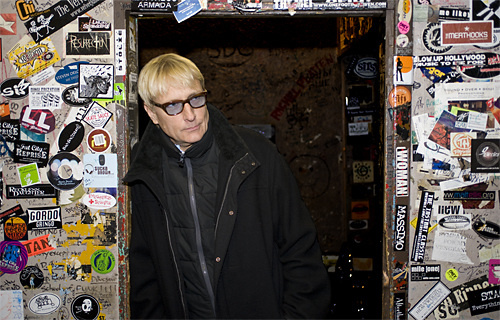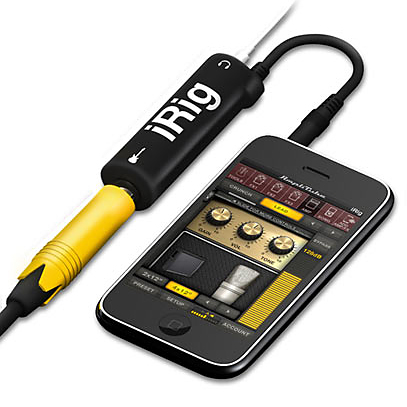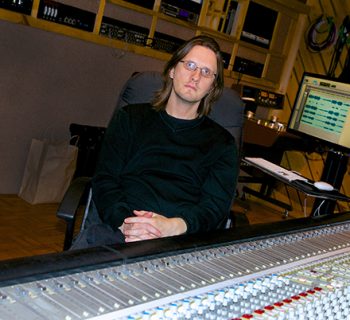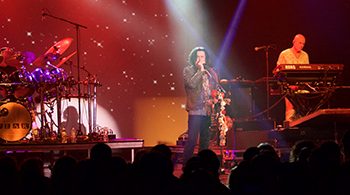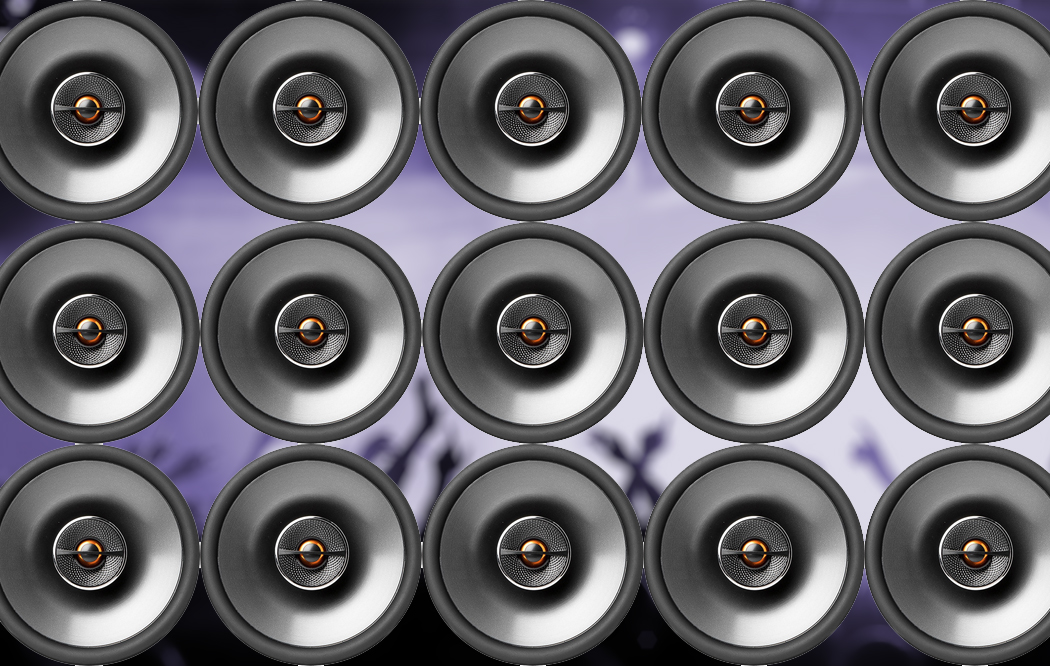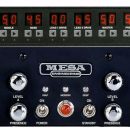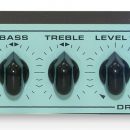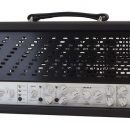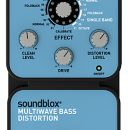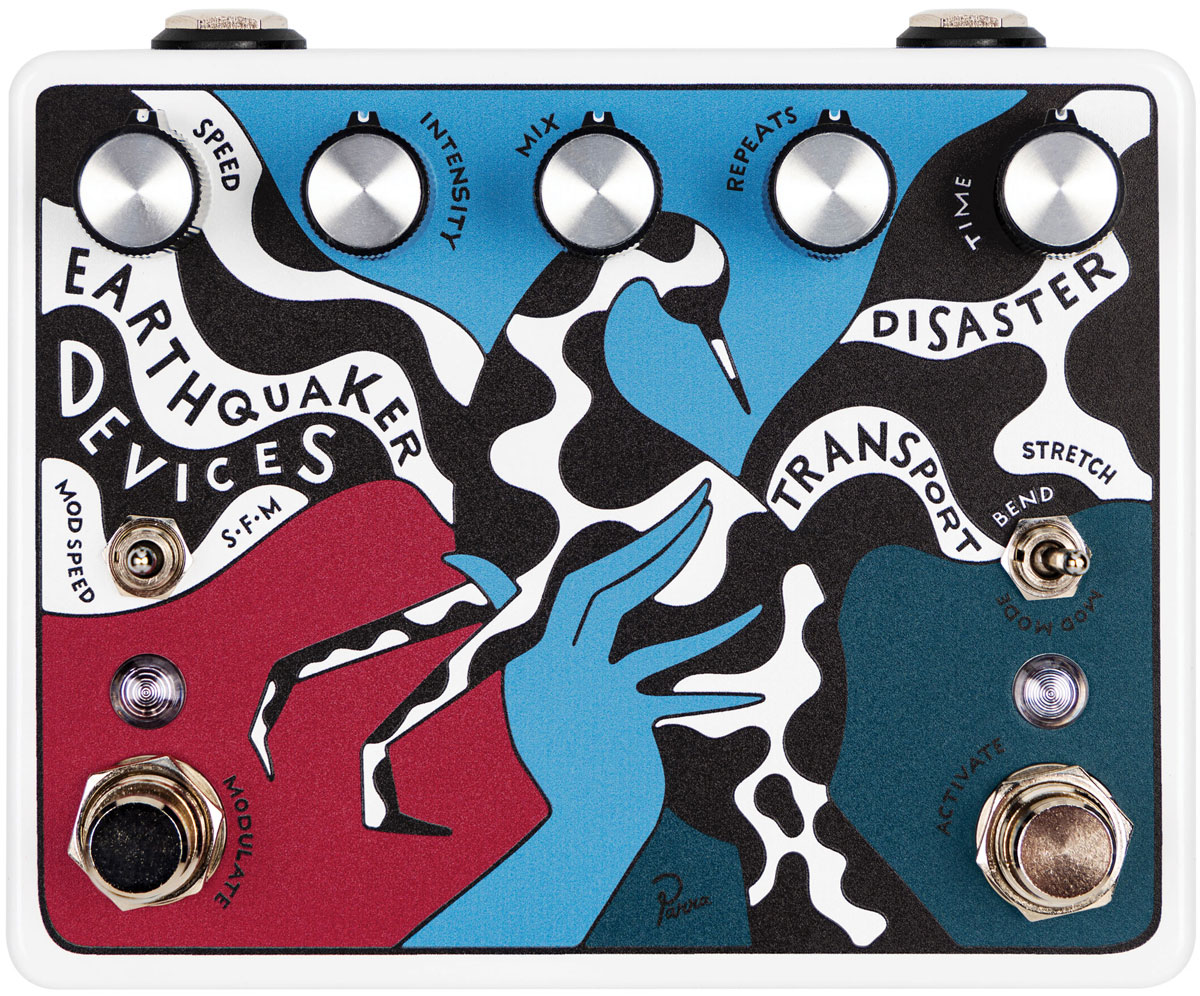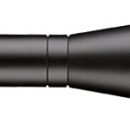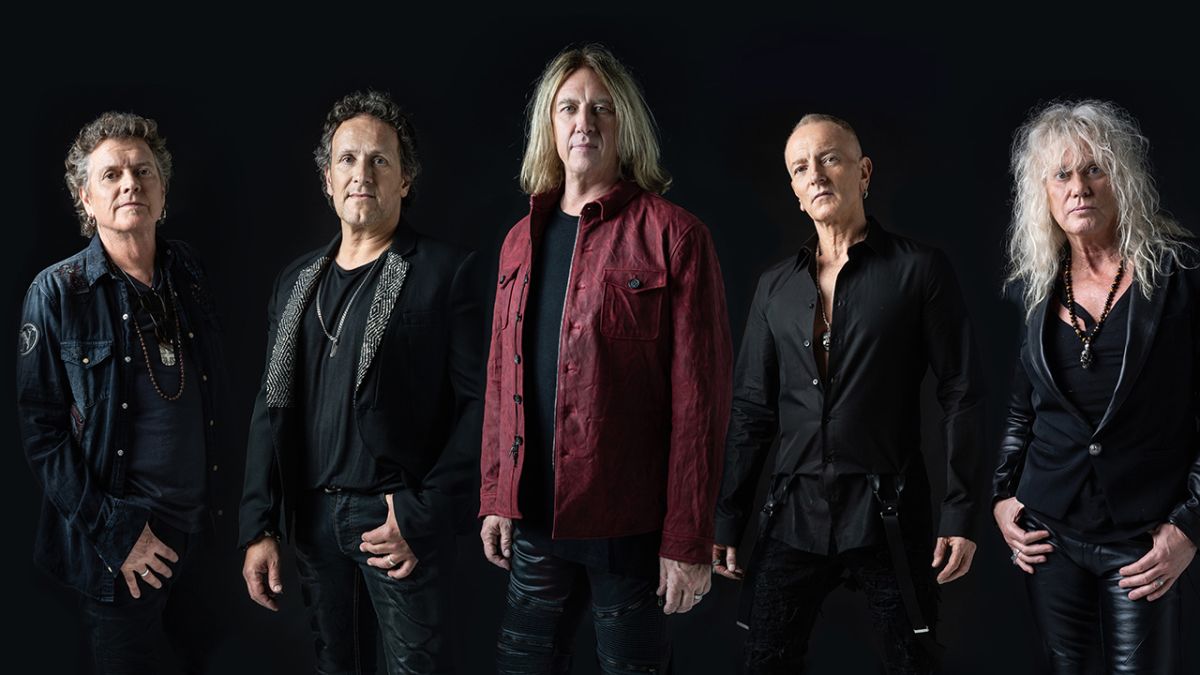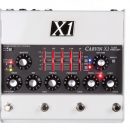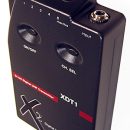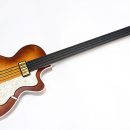The way he moved about the stage was like clockwork. His mechanical yet smooth movements were complimented by his look: a patterned, button-down shirt tucked into tight jeans and a pair of vintage-looking sunglasses. He effortlessly made his bass sing, murmur, and moan. His left hand glided up and down the bass, navigating the neck like it was a map of his hometown, a grid of familiar streets and hangouts. He was relaxed, yet locked into Anton Fig’s groove and precise with pitches while jazz guitarist Oz Noy played above, on, and around him.
Just an hour earlier we sat in a cold ice locker of a room in the back of Manhattan's famous Bitter End, wondering if this would, in fact, be the last interview we ever gave before freezing to death. It was snowing outside, and only a few degrees warmer here amidst the bar’s freezer units and stacks of alcohol cases. Well, at least we could drink to our demise.
Will Lee is a decorated hero of bass guitar, whose credits extend far beyond his jazz background and appear throughout many corners of the music industry. A graduate of the University of Miami School of Music, he is currently a member of The World’s Most Dangerous Band on The Late Show with David Letterman.
As a studio musician, Lee has played on more than 400 albums, working with artists as diverse as Carly Simon, Barry Manilow, Mariah Carey, and Dave Matthews. He is also a member of The Fab Faux, a famous Beatles tribute band. Last but not least, he plays regular gigs with guitarist extraordinaire Oz Noy at intimate jazz clubs like the Bitter End, where we got the scoop on his career, the industry, and the “grruh” in his fabulous new signature bass.
“I didn’t have to labor for hours memorizing my part
for something I only have to play once in my life.”
MPc: Tell us about your beginnings as a musician.
WL: My scene was probably like a lot of people who start learning before they even know there’s such thing as music. In other words, from even before you’re born, probably. My parents were both musicians, so by the time I hit whatever this atmosphere is here, the day I was born I had already heard quite a bit of really good stuff.
My mom being a jazz singer and my dad was a bebop piano player/instructor, because he was an educator, Dean of the University of Miami School of Music for twenty years, and stuff like that. I grew up hearing a lot of jazz around the house — a lot of Miles Davis, Nancy Wilson, Cannonball Adderley, things like Sarah Vaughan and stuff, that’s what was constantly going on in our house.
And my mom and dad would actually play too. Like when they’d have a party and they’d play together, she would sing and he would play. So that was very cool, and I met a lot of jazz-ers and musicians when I was growing up. I met Charlie Parker when I was, like, an infant. He held me in his arms. I don’t remember anything about it. But Stan Kenton was also in the household, and guys like Shorty Rogers (a trumpet player) and Don Jacoby (another great trumpet player), Jerry Mulligan, and remember Mitch Miller?
MPc (Scott): Yeah, that was my dad’s generation.
WL: That was somebody that my dad knew. So these people were just going in and out of my house forever. This was from San Antonio, Texas through to my upbringing in Florida, in 1970. In 1964 our family lived to Florida when my father became the University of Miami School of Music’s Dean.
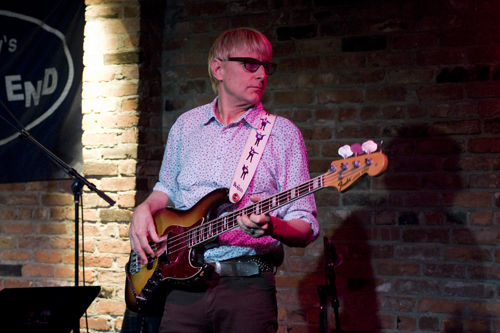
MPc: Does the music you listened to then influence your playing now?
WL: Well yeah, they’re always going to be around thanks to recorded music and stuff today. I feel the influence of a lot of the stuff I heard when I was a kid still in my ability to “feel” jazz music. For example, Miles Davis was constantly the soundtrack to our house, so I can relate easily to that kind of stuff.
MPc: How important do you think it is to be trained formally in a music school?
WL: That’s a good question. That not only dictates what your direction is going to be, that really helps steer you to what your music is going to be. But if you find yourself a musician who wants to be really well rounded and play with a lot of other musicians, say somebody puts a chart in front of you, you can’t be scratching your head — you need to be playing. So you need to have some background in reading, and in order to write music you need to be able to read music.
So the whole calligraphy thing comes into play when you’re actually wanting to translate to other musicians and make music really fast. But if you have a lot of free time to just sit around and jam, say, like The Beatles did, The Beatles were super-quick, quick-thinking people. They didn’t read a note of music and they didn’t do too badly. But I’m very happy that I can read because I don’t have to spend a lot of time learning something. I can just jot it down and when I get to where I have to play the music, say preparing something for the Letterman show, to play with somebody there, if I’ve done my homework which only took a few seconds for me because I write quickly, then I didn’t have to labor for hours memorizing my part for something I only have to play once in my life.
“It’s nice if you can just start with a sound that you like,
rather than having to fight that instrument by dialing its sound in.”
MPc: Regarding writing for the Letterman show, do you guys chart most of the music out?
WL: Well, it depends. If we’re going to play with somebody once, believe me, I have no reason to sit around and try to kill myself memorizing the piece of music, so I’ll write it, because it’s so much quicker to have it written down, and it’s also something you can talk about with the other players — “Let’s go to letter B and do this. It’s like a language.”
MPc: You have a new signature bass, a Sadowsky. Why don’t you tell us about that?
WL: I do. it’s a very special thing because I have this relationship with Roger Sadowsky for thirty years, and after thirty years of us working together, he has this uncanny ability to take the silly things that I say about what I need, and when I say silly I mean it’s silly not in terms of anything technical. I’ll always talk to him in terms of feeling, like I need more [grunts] in the sound and he knows what that means. He’ll just say, “Oh I see, so I’ll put another 30db capacitor in there for you. No problem.” Woah, okay, great! And it’ll come back to me and it’ll be really fun to play all of a sudden.
So after 30 years of that kind of nonsense, developing this language, he came to me and said, “Do you want to do a signature bass?” and I said, “Oh man, yeah, I have some ideas, too.” Because, you know, there were certain frustrations I was having about playing some of his instruments live that led to me asking him to give it a special sound, specifically an EQ boost at 500 hz.
MPc: Why not just go to your bass amp for the EQ bump?
WL: Well you can always do that, but it’s nice if you can just start with a sound that you like, rather than having to fight that instrument by dialing its sound in. It’s better to have the sound there. Because, first of all, imagine you’re in the studio and you’re not even plugging into an amp. You want your sound to be right there, immediately, without the help of other stuff.
MPc: Do you tend to record most things in the studio direct?
WL: Yeah, I do. I look for good direct boxes, compressors, and stuff like that, but as far as amplification, it’s almost unusual for me to use an amp in the studio. I mean I love it when the luxury is there, but when it’s not I’m fine because I’ll really only monitor the direct sound anyway. Because that helps me know that the pocket is right where I want it to be. And as far as when I leave, engineers can do anything they want to fatten it, add tube things, any other compression or EQ or whatever they want to do. But to know that I’ve given them a good, pure performance, you know that’s all I need to make myself feel like I’ve given what I’m supposed to give to a record or a song.
“I really love the bass to be as versatile as possible and make as many sounds as possible.”
MPc: What equipment do you play on Letterman?
WL: Well the bass, I use the Sadowsky Signature. The rig itself I’ve been using a Hartke HyDrive System, that’s their newest bass series. I don’t think that the audience hears much of that though, because mostly what I’m doing is I’m going through a Radial D.I. into the board, and whatever our sound engineer Harvey Goldberg does to the sound, that’s what you hear.
MPc: How much does the live audience get to hear you play versus the ten seconds a television audience gets to hear?
WL: They hear a lot of music. Because, okay, say you’re watching a performance of the David Letterman show, any show, any night, and the commercials come on [for] three minutes. Well, there’s a chance that we’d be playing for up to, like, ten minutes. While producers are talking to Dave, they’re figuring out what the next move is going to be, and all that kind of stuff. Sometimes we stretch for a really long time, so you get a small concert when you come to the show.
MPc: Do you make much use of effects in your playing?
WL: I love effects. Any excuse to use an effect, I’ll use an effect.
MPc: What are some of your favorites? Pedals or rack gear, any specifics?
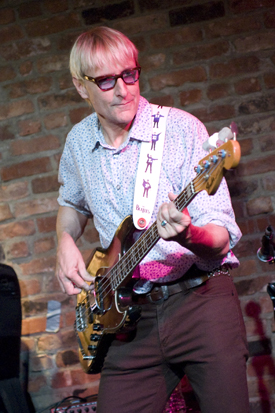 WL: I was one of the first guys to ever plug a bass into a “thing,” in New York. I remember bassist Willie Weeks came to my apartment one day because he heard about me and I was the gadget guy, you know, “Mr. Sounds.” He actually came to my house and asked me to give him a tour through all these things — chorus pedals, envelopes, stuff that I was fascinated by… Because I really love the bass to be as versatile as possible and make as many sounds as possible, so whatever there was for bass at the time, I was getting it all.
WL: I was one of the first guys to ever plug a bass into a “thing,” in New York. I remember bassist Willie Weeks came to my apartment one day because he heard about me and I was the gadget guy, you know, “Mr. Sounds.” He actually came to my house and asked me to give him a tour through all these things — chorus pedals, envelopes, stuff that I was fascinated by… Because I really love the bass to be as versatile as possible and make as many sounds as possible, so whatever there was for bass at the time, I was getting it all.
I developed a relationship with Electro-Harmonix early on, and they were letting me test their stuff. And Mike Matthews still brings everything that he makes over to my house and he says “What do you think of this? How do you like this?” So, I’m fascinated by that. Right now my favorite thing to do is to plug into something that’s small, that’s got everything in it. I’ve been using the Boss GT-10B. I’m learning how to program it. Because you can have all your ten pedals with you, but it’s that eleventh pedal that you need, that you don’t have when the time comes to want it or need it. But you can dial it up if you have a multi-effects processor. I’ll use it tonight with Oz [Noy], for sure.
MPc: Yeah, he uses a few pedals. (see our feature story on Oz Noy for more on his pedal madness here).
WL: Oz is the master! I’ve watched him in the studio and it’s unbelievable what he does, because when you see us live you’ll see I’m on one side of the stage, then there are drums, then there’s Oz way over in another state from where I am. I used to think, “Well, he’s just kind of randomly hitting pedals and it’s really great,” but being in the studio with him was when I realized that he’s developing his solos very organically and it all has to do with a certain order of the way he kicks in those pedals. It’s not like he’s randomly hitting a thing. He’s designing his solo, it’s an extension of [his hands], the way he uses his pedals. I guess he’s part ape, I don’t know.
“To be a jazz player gives you the ability to do all kinds of other stuff.”
MPc: Do you find that being involved in the Letterman show has limited your ability to get out and do things you would like to do as a bassist?
WL: Well I can say, easily, yes. The first thing that comes to my mind is “yes,” because it’s caused me to have to face the fact that producers who want to have all day sessions that know I have to leave in the middle of that session, no matter where we are in the session… say we’re at a really creative point in the session where now’s not the time to leave; I have to leave [to get to the CBS studio]. So a lot of people don’t have the patience for that.
Even my really great friend [producer] Arif Mardin, who I did 26 albums with, I could see how he was really tolerant of that for a lot of years, and it just got to be too inconvenient for him. So he wouldn’t book me the way he had previously done because he knew he didn’t have that whole stretch. So I know that some people will not tolerate it, and for that reason I’ve probably lost certain things, but the good news is that I’m very happy that I haven’t had to live on a bus all these years. And for that reason, I don’t mind.
MPc: What are some of the other basses you enjoy playing? You must have a big collection beyond Sadowsky’s?
WL: I’m not really a big collector, but I do have a lot of stuff. Obviously I have all the basses that Paul McCartney used for Beatles music because of The Fab Faux. So that includes: you have to have a Hofner, you have to have a Rickenbacker, they all have to have flat wound strings, of course. You have to have a ’66 Fender Jazz bass with round wounds on it in order to do those songs from The White Album that Paul used. And rumor has it that John played a ’66 Fender jazz on “Helter-Skelter.” And of course there’s the Fender VI, which is the six-string bass that looks like a Strat, which is important because George or John would play those on tracks where Paul would play piano or guitar, [like] “Golden Slumbers” or “Maxwell’s Silver Hammer.” So the Fender VI is kind of hard for me to play.
MPc: What do you play the most regularly? And is your new Sadowsky a four- or five-string?
WL: It’s a four-string, so far, but we’re gonna’ do five-strings, because, you know, you gotta’ have that. And it’s amazing… people are actually buying it! Every one he’s made; he’s sold, which is really great. And it’s not a cheap bass. It’s a real professional level instrument.
MPc: Well Sadowsky doesn’t make a cheap instrument. (laughs)
WL: Good point. His Metro Series is going to be probably up there, I think. I kind of wish it were cheaper because I’d love more people to play it. It’s really a good instrument.
“There were some days when I’d do five to eight sessions a day — that was a normal day for me. Now I do, like, five to eight a week, if I’m lucky.”
MPc: Speaking of Metro, Why don’t you tell me about the new Metro album? I understand you did some writing on the new album?
WL: Yeah! I got really inspired, when you’re surrounded by guys like Mitch Forman and Chuck Loeb and Wolfgang Haffner, you can sort of have a spark of an idea and these guys can turn it into music, which is amazing. We were all very inspired too because we wanted to dedicate the record to Mike Brecker — it’s inspiring just to think about the guy. So stuff came really easily, to come up with music.
MPc: You’ve worked with so many different artists… but one name that I don’t remember seeing is Steve Smith. You know he recently moved to New York?
WL: Yeah, we’ve done some Buddy Rich things together — Buddy Rich memorial concerts, but I think the only time we’re actually on any kind of recording [together] is a Mariah Carey album.
MPc: That’s so funny, given you’re both such great jazz players, that you’re on a pop album like that.
WL: Well think about it. It can’t go the other way around. Pop players can’t necessarily play jazz, but think about who the first studio musicians were. Even the Motown guys. They were just playing jazz. They came in with jazz instruments in their hands, playing jazz every night, and when they were asked to come into the studio and play whatever this new music is, not only was it not defined yet, it was them that defined it. So, in other words, to be a jazz player gives you the ability to do all kinds of other stuff.
I don’t know if you saw Standing in the Status of Motown, the movie about James Jamerson. It featured a lot of the living funk brothers that had made these great Motown records. Those guys were playing bebop tunes in jazz clubs around Detroit. But that’s what they knew how to do, and these young songwriters would come in, like Smokey Robinson, and say “Here’s my song… and I like it to sound like this” and then they would interpret whatever he had written, whatever he was giving with whatever knowledge that they brought in, and came up with an entirely new amalgamation of sound. But there wasn’t even electric bass for a long time!
There were pop records first and the electric bass was actually later. The pop records consisted of guys playing [upright bass] for a really long time. And this new thing was invented that I play, but it’s still a very young instrument, one of the youngest. But those guys… what did they know how to do? They knew how to play changes. That’s kind of what they had to do to form pop music over jazz. I think it’s really directly related.
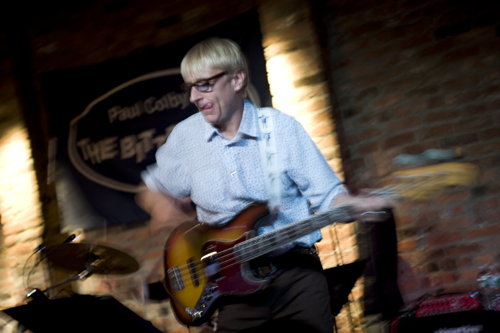
MPc: When you’re in the studio recording with artists, how much creative leeway do you get?
WL: It depends on how preconceived their idea is for you, the studio player. The song really dictates what you play, so going back to the whole Motown thing, the players in the Motown rhythm section give James Jamerson, the bass player, so much credit for shaping each song and making them sound different from all the other songs they recorded, even if they had the same tempo and the same key and the same type of groove. The songs spoke to him in a way that he would completely give it the flavor or whatever the track is. Like that hit song, “Baby, Baby, Where Did Our Love Go?” over to “Bernadette” or even over to “I Can’t Help Myself,” and all these songs, they’re so unique and a lot of it is coming from what the band is doing, more than the songwriting itself in a lot of cases. So I really think the song suggests what to do.
If you can tap into that energy of what the song itself is telling you to do, that’s really where the instrumental part of the track comes from. It comes from the relationship between the written song and how the players interpret it. I remember one time being in the studio and we were waiting for Steve Gadd to get there, and if I remember correctly, I think it was an Elliott Randall session, and we were sitting around for, like an hour and a half, and Elliott is already putting us through the basis of his song, and for the life of me I couldn’t think of anything to play. But ninety minutes later when Gadd came in and sat down at the drums, my part came to me (snaps) instantly. I just needed the relationship between me and the drummer for me to figure out what to do. I couldn’t think of anything but then it was almost mindless how quickly it came, once the groove was laid down. It was, “Oh!”
MPc: How has the industry changed for you as a section player?
WL: Well, the industry has done a complete 180 from when I got to town, because when I got to town, there were ten or twenty major studios in [New York City] that were just turning out music around the clock. And the reason they were doing this, and they were able to stay alive doing this, was that there was all this money flowing in the direction of people making records. People were buying and selling records like crazy, so what it meant was that especially in a town like New York, it was driven by money. The whole scene was driven by this desire for people to buy, and to sell, music. So a lot of things happened along the way.
And one of the things that happened was greed. Greed happened from the position of record companies themselves, publishing companies, clients in the jingle world… people got on vocal contracts that weren’t singing, and they were just sucking the money dry out of the source where it was supposed to be going to. There’s only so much money available for anything, so it kind of backfired on all those people that were sucking it dry. Because now, I don’t know what they’re doing, but luckily for me I’m doing what I’ve always been doing, and that’s playing live, playing in the studio, playing whatever. But the calls are not the same. There were some days when I’d do 5-8 sessions a day — that was a normal day for me. Now I do, like, 5-8 a week, if I’m lucky.
And a lot of them are happening in my own home, just because of how the music is now delivered. CDs, records, whatever, that’s just a music delivery system, which isn’t necessary anymore. So a lot of truckers are out of jobs, people that used to deliver those boxes of records to stores, they’re delivering something else, I don’t know what it is, but it’s not music.
MPc: Wrapping things up, what advice do you have for guys that are going through music school now that are looking for the professional career?
WL: Well, I’ve always said the same thing about how to approach that, and one of the great quotes my old friend Hiram Bullock used to say is, “If you want to make a lot of money, be a banker.” But, coming from me, if you want to do music, do it because you love it. Don’t do it because you think it’s going to make you a fortune, by any means. Just do what you dig, do what you like, if you can afford to do that. You have to find out what you like, and if you can find out what you like, do more of it. Do as much as you can afford to do. And who knows, the returns may end up being huge for you.

